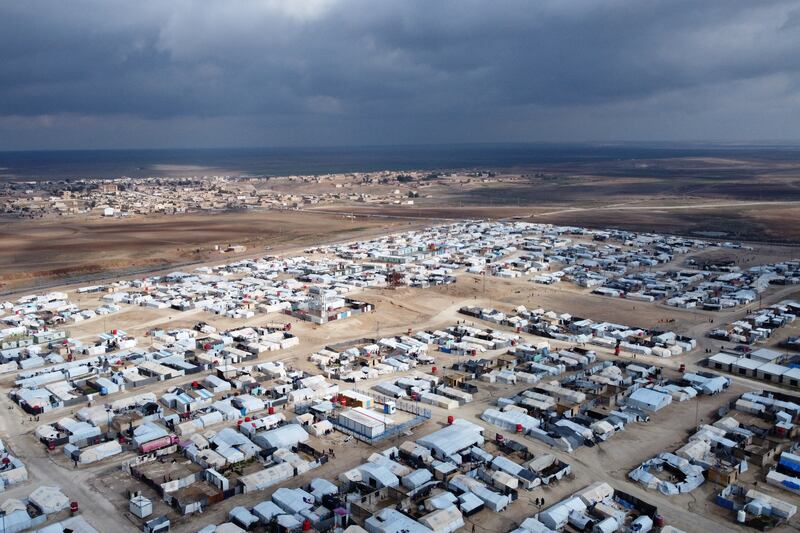After the collapse of President Bashar al-Assad’s regime in Syria, Indonesia should repatriate nearly 400 citizens linked to the Islamic State group, otherwise they could be exploited in global conflicts or fall back into militancy, analysts are warning.
One of them, Yanuardi Syukur of the University of Indonesia’s Center for Middle Eastern and Islamic Studies, sees opportunities to work with the new Syrian leadership.
Rebel forces captured Damascus on Dec. 8 and toppled the Assad regime, which was accused of human rights abuses including the use of chemical weapons.
“The Indonesian government should proactively engage with this new government for repatriation,” Yanuardi told BenarNews, highlighting the need to safeguard Indonesian citizens while ensuring they no longer pose a security threat because of extremist ideologies.
The Syrian conflict, which began in 2011 during the Arab Spring – a groundswell of anti-government uprisings across North Africa and the Middle East – has left a complex legacy including the plight of foreign fighters and their families.
Following the defeat of Islamic State (IS) in 2019, many nations have faced the dilemma of repatriating and deradicalizing citizens or prosecuting them for terror-related crimes.
In Indonesia, the world’s largest Muslim-majority nation, the issue is particularly sensitive because of the country’s history of Islamist militancy and terrorist attacks.

The National Counterterrorism Agency (BNPT) estimates 375 people, including 145 children, are confined to the al-Hol and Roj camps in Syria. The people living at the camps are families of IS fighters. The al-Hol camp alone houses over 70,000 refugees, according to recent figures from the government and rights organizations.
Conditions in the camps are dire, with reports of exploitation, indoctrination and deteriorating living standards, analysts said.
After the fall of President Assad, a new political landscape is unfolding in Syria with Ahmed al-Sharaa (once known as Abu Muhammad al-Julani) emerging as a key figure in the transitional government. Analysts expect it to take a moderate approach compared to the radical factions under Assad.
Still, Yon Machmudi, a lecturer in Islamic studies at the University of Indonesia, warned that the former IS members including Indonesians could become mercenaries.
“They could move from place to place with no other option, surviving by becoming foreign fighters,” he told BenarNews.
Shift in policy
BNPT is assessing which individuals are safe to repatriate, focusing on deradicalization and reintegration, said Tjandra Sulistiyono, the agency’s head of the general bureau.
“We are in the process of identifying and evaluating how many Indonesian citizens will be repatriated,” Tjandra told BenarNews, adding that rehabilitation facilities have been established in Sentul, near Bogor.
RELATED STORIES
[ Swift action needed on Indonesians in Islamic State refugee campsOpens in new window ]
[ Indonesia confirms 5 citizens linked to funding IS efforts to recruit teensOpens in new window ]
[ US Sanctions Indonesian NGO for Alleged Terror Financing in SyriaOpens in new window ]
Under Prabowo Subianto, Indonesia’s new president, this marks a shift in policy.
In 2020, the government of then-President Joko “Jokowi” Widodo announced it would not repatriate citizens who had joined IS in Syria but would consider bringing back some of their children on an individual basis.
Repatriating former IS members is fraught with political and security risks, as demonstrated by past cases of returnees reverting to extremist behavior.
An Indonesian husband-and-wife suicide bombing team killed 23 people attending Catholic Mass in Jolo, Philippines, in January 2019. At the time, Indonesian authorities said that the couple, Rullie Rian Zeke and Ulfah Handayani Saleh, had been rehabilitated through a government program after they unsuccessfully tried to join IS in Syria.
In 2022, BenarNews reported that over 2,150 Indonesians had traveled to Syria and Iraq to join IS between 2013 and 2017, based on figures from the BNPT.
Of those, more than 555 were deported before they entered Syria, 194 voluntarily returned home and 127 were confirmed dead. The BNPT classified the remaining 1,250 Indonesians as living in IS refugee camps, being detained in Kurdish prisons, missing or at large in Syria and Iraq.
Despite the risks, Haula Noor, a researcher in terrorism and family dynamics, said some action must be taken or those still in Syria could be exploited during the ongoing conflicts in Syria.
“This needs to be done. There’s a fear that if they stay too long, they could be exploited,” she said.
Haula, who teaches at the International Islamic University of Indonesia, called for a phased process based on an assessment of radicalization levels.
“Returnees must be classified into those still loyal to IS and those who have renounced its ideology. Repatriation should start with individuals and families deemed low-risk,” Haula said.
Legal obstacles complicate the process. Many Indonesians in the camps are children born to mixed-nationality couples and their legal status as citizens is unclear, analysts said.

Rakyan Adibrata, a researcher at the International Association for Counterterrorism and Security Professionals, stressed the importance of prioritizing children.
“When they went to Syria, they had no choice but to go and did not have an option to argue against their parents,” Rakyan told BenarNews.
Adlini Ilma Ghaisany Sjah, a researcher at Nanyang Technological University in Singapore, warned that inadequate resources could undermine deradicalization efforts.
“Rehabilitation must be tailored to individual needs and conducted over an extended period,” Adlini told BenarNews. Short-term programs risk failure, especially given the deep psychological trauma and ideological indoctrination many returnees have experienced.”
Partnerships with civil society organizations experienced in counterterrorism and deradicalization could play a pivotal role, Adlini said, warning that societal rejection or stigmatization could drive returnees back to extremist networks.
“The community must be prepared to accept and support these individuals. Without societal inclusion, the risk of recidivism remains high,” Adlini said.
